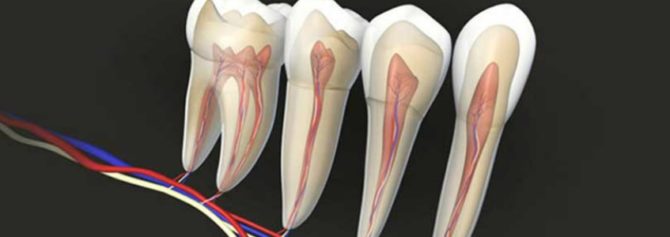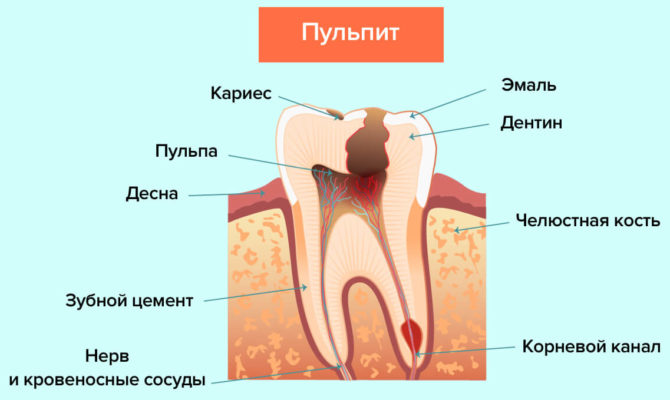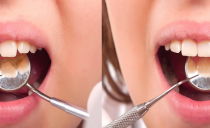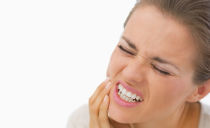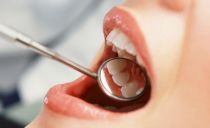Dental nerve inflammation: symptoms, treatment, pain management at home
Dental nerve inflammation is called pulpitis. The inflammatory process develops in the neurovascular bundle of the tooth pulp due to an infectious lesion of internal tissues. The main symptom of inflammation of the dental nerve is an increasing pain syndrome, treatment is required immediately. If you do not suppress the source of infection, it will quickly spread to adjacent tissues and cause extensive inflammation of the root and periodontium.
Content
Reasons why a tooth nerve becomes inflamed
The immune system responds to an infection that affects the internal tissues of the tooth with local inflammation. The cause of the penetration of pathogens into the pulp may be:
- Neglected caries. The carious cavity that has reached the dentine violates the integrity of the hard tissues protecting the pulp chamber. The pulp is exposed, as a result of which it becomes possible for bacteria to enter from the oral cavity. The risk of developing pulpitis with caries is especially great due to insufficient oral hygienewhen plaque accumulates on the surface of a diseased tooth. The doctor can identify the risk of pulpitis during a routine examination - even before the patient has a toothache.
- Poor quality dental services. The infection can get into the pulp during the treatment of dental diseases. For example, with insufficient antiseptic treatment, violation of crown turning technology for installing an orthodontic design, incomplete filling of the root canals with filling material. The infection spreads exclusively inside the pulp, timely diagnosis of such inflammation is complicated by the absence of visual defects - the crown looks healthy, the pulp is not exposed. The patient knows that a nerve in the tooth has become inflamed, and something needs to be done by an attack of severe pain.
- The use of low-quality dental materials: antiseptics, gaskets, filling compositions.
- Hypothermia and transferred SARS. To catch nerve fiber, you don’t need to be at minus temperatures for a long time - just a few hours in an air-conditioned room or trips in vehicles with open windows in the summer.
If the nerve bundle in the pulp has become inflamed from hypothermia or after an acute respiratory viral infection, there is a high probability of the spread of the inflammatory process to the facial nerve branches and the development of trigeminal neuralgia.
- Mechanical injuries resulting in inflammation of the internal tissues of the tooth.
- Inflammatory periodontal diseases: gingivitis, periodontitis.
- The presence of cysts and granulomas in the jaw area.
Symptoms of a nerve inflammation in a tooth
Severe toothache indicates inflammation of the pulp. By changing the nature of the pain syndrome, the doctor can judge the duration of the inflammatory process. In the early stages of the development of the disease, pain attacks are rare, and the pain is aching. At this stage of the disease, patients rarely go to the dentist. Without proper treatment, inflammation of the nerve of the tooth progresses, and the pain becomes acute and throbbing.
A characteristic sign that a person has an inflamed nerve bundle is the lack of a clear localization of pain. Patients with pulpitis cannot outline the place of maximum pain. Usually they only indicate which side of the jaw hurts the tooth.
With pulpitis, there is a pronounced tendency to intensify the pain syndrome with the slightest movements of the jaw. Enamel sensitivity sharply increases, the most acute reaction is observed on temperature irritants.
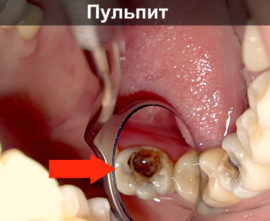 Due to inflammation of the pulp, there is a strong compression of nerve fibers located in a limited space. Severe gum edema may form. The intensity of pain increases at night, when a person is in a horizontal position, so the inflamed nerve of the tooth often deprives patients of sleep and rest.
Due to inflammation of the pulp, there is a strong compression of nerve fibers located in a limited space. Severe gum edema may form. The intensity of pain increases at night, when a person is in a horizontal position, so the inflamed nerve of the tooth often deprives patients of sleep and rest.
If the inflammation is not stopped in time, the process will spread to the deep tissues of the tooth, and suppuration will join it, which is evidenced by a characteristic bad breath. When the inflammatory process becomes chronic, pain becomes aching and manifests itself during chewing.
With pulpitis, there may be an absolute absence of pain symptoms. The severity of this manifestation depends on whether the pulp chamber is completely closed with dentin.
What to do at home when a nerve in the tooth hurts
Toothache that occurs with an inflamed nerve can be very severe and exhausting. It is able to deprive a person of sleep and performance. It is not always possible to get an appointment with a doctor in the next few hours after the onset of a pain attack, so you need to know how to stop the pain yourself.
To calm the tooth nerve at home, you can use medication painkillers designed to soothe pain, and traditional medicine methods. Anesthesia is not a cure. The use of anesthetics and the use of folk remedies with an analgesic effect helps to kill toothache, but the inflammatory process inside the pulp continues. Therefore, within a few days after the first pain attack, you must go to the doctor.
Urgent treatment in dentistry is necessary in the presence of the following symptoms:
- weakness and drowsiness;
- temperature increase;
- increased pain;
- the appearance of severe swelling of the gums.
What drugs can calm a nerve in a tooth at home
To relieve pain at home, you can use dental drops and painkillers in tablets: Ketanov, Nurofen, Pentalgin, Nimesil. The advantage of drug therapy is that the pain will calm down within 5 minutes after taking the medicine.
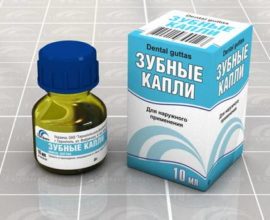 Drops are harmless than pills. They are even used to anesthetize children's teeth, but they can be used no more than a day. The most effective drops that relieve toothache with inflamed nerve endings are:
Drops are harmless than pills. They are even used to anesthetize children's teeth, but they can be used no more than a day. The most effective drops that relieve toothache with inflamed nerve endings are:
- Dent. Most often used in dentistry to relieve pain in pulpitis or caries complications.
- Stomagol. Soothes pain caused by infectious diseases and inflammatory processes.
- Phytodent. In addition to painkillers, it contains numerous plant extracts with an antiseptic effect, which prevents the spread of infection.
How to remove toothache folk remedies at home
Many herbs and oils have a proven antiseptic effect and a calming effect. To reduce the severity of pain and prevent the spread of infection from tooth pulp at home, you can do:
- Herbal compresses.
- Warm rinses with herbal infusions.
- Alcohol lotions.
- Oil applications.
To do alcohol lotions and applications when a tooth nerve hurts, it is possible only if exposure of the pulp chamber has not occurred.
What to do if the tooth nerve is bare
With severe destruction of the tooth crown, the pulp can be exposed, as a result of which the nerve is exposed. Such severe destruction can result from untreated caries, mechanical trauma that triggered a spallation of a significant part of the crown, or illiterate dental procedures.
If the pulp chamber is exposed, severe pain will occur, which is poorly relieved by analgesics and is often accompanied by fever and general malaise. Infection of open pulp with pathogenic microorganisms occurs very quickly and is fraught with serious health complications, therefore, emergency dental care is necessary. Doing it yourself with a bared nerve of the tooth is strictly contraindicated, such a pathology should be treated by a dentist.
Treatment of inflammation of the nerve
Before prescribing treatment for pulpitis, the dentist conducts a thorough examination of the oral cavity and the diseased tooth to determine the cause of the disease and its stage. To clarify the diagnosis and determine the degree of destruction of the nerve fiber in most cases, an x-ray is prescribed.
After studying the x-ray, the doctor makes a decision about the need to remove the nerve or the advisability of its preservation and prescribes treatment procedures. If necessary, the doctor kills the nerve fiber with arsenic paste. After it is removed, the root canals are sealed, and a filling is installed on the tooth crown.
Regardless of the principle of treatment of pulpitis, antibiotic therapy is prescribed to kill pathogenic microflora and eliminate the likelihood of inflammation in the dental canals and root of the tooth. Additionally, the doctor prescribes drugs to the patient that will relieve postoperative pain.
What treatment tactics to choose and what exactly is best done, if it is decided not to remove the nerve from the tooth, the doctor decides based on the stage of the disease. The most gentle method of treatment is the removal of affected tissue and the application of a special antiseptic paste to a healthy area of the nerve bundle. It is necessary to remove the affected tissue from the pulp in order to prevent the spread of infection. Antiseptic paste provides early healing and eliminates the risk of recurrence of the inflammatory process.

